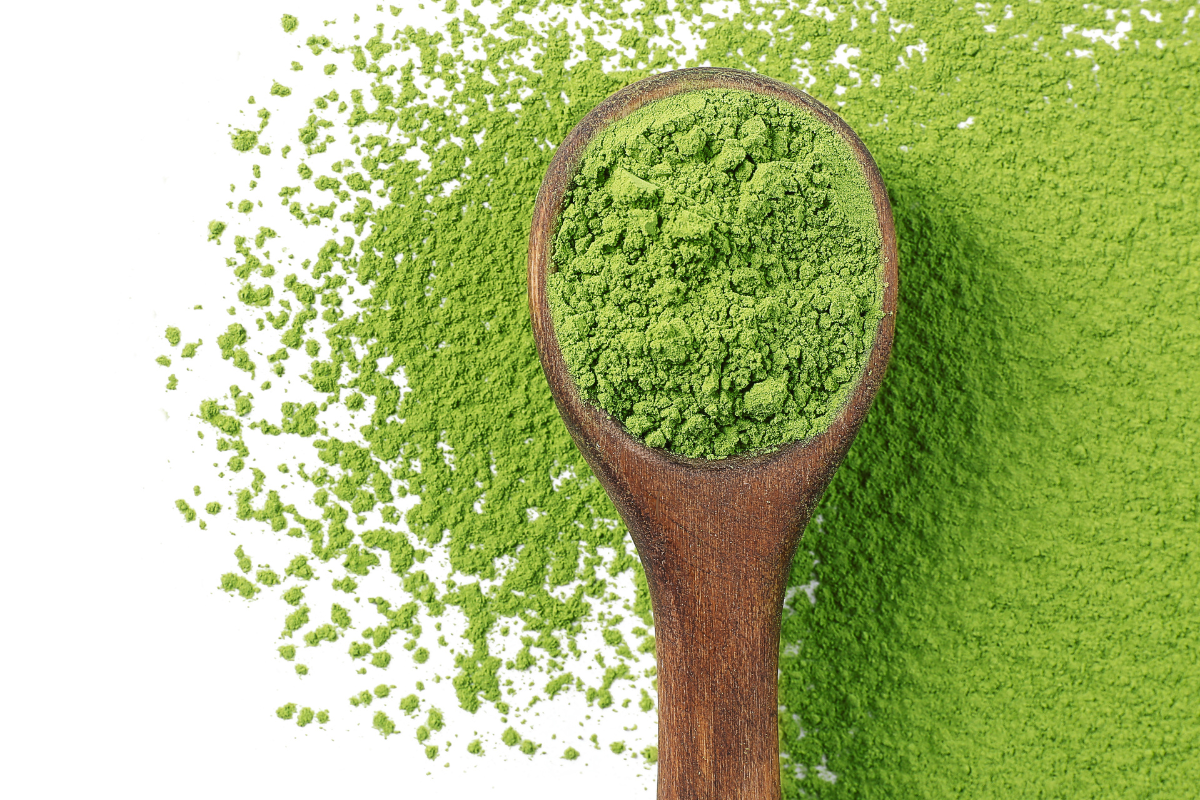L-theanine, an amino acid found mainly in green tea leaves, is gaining in popularity thanks to its beneficial effects on mental and physical well-being. Used to reduce stress, improve sleep, and even for its potential effects on weight loss, it is increasingly being adopted as a dietary supplement. However, while its benefits are widely touted, it is essential to also consider the potential dangers and recommended doses.
What is L-theanine?
L-theanine is a non-essential amino acid, meaning that it is not naturally synthesised by the human body, but can be obtained through diet, mainly from green tea leaves(Camellia sinensis), or by consuming dietary supplements. Unlike the majority of amino acids involved in building proteins in the body, L-theanine is not involved in this process. Instead, its biological role is linked to its action on the central nervous system, by modulating several key neurotransmitters involved in regulating mood, anxiety and general well-being.
The effects of L-theanine on the brain are particularly interesting. It acts principally on three major neurotransmitters:
- GABA (gamma-aminobutyric acid): This inhibitory neurotransmitter promotes relaxation by reducing neuronal excitability. L-theanine increases GABA activity, which helps to reduce stress and induce a state of calm without causing drowsiness.
- Dopamine: This neurotransmitter is crucial for feelings of pleasure, motivation and reward. L-theanine helps regulate dopamine levels, promoting a better mood and reducing depression.
- Serotonin: Known as the ‘happy hormone’, this neurotransmitter regulates mood, sleep and appetite. By increasing serotonin activity, L-theanine can help improve sleep quality and reduce anxiety.
Is L-theanine a natural antioxidant?
Yes, it is considered a natural antioxidant. Although it is not a classic antioxidant, like vitamin C or vitamin E, it acts indirectly by strengthening the body’s antioxidant defence systems. Several studies have shown that L-theanine stimulates the production of glutathione, a key antioxidant in the body, and increases the activity of antioxidant enzymes such as superoxide dismutase (SOD) and catalase. These enzymes are crucial for neutralising free radicals, which are unstable molecules that can damage cells and accelerate ageing or promote the development of chronic diseases.
In addition, L-theanine helps to reduce oxidative stress by limiting the oxidation of lipids and proteins, thereby protecting cells against damage caused by free radicals. This antioxidant capacity, combined with its relaxing effects and other benefits, makes it an interesting natural supplement for maintaining good cellular health and preventing damage linked to premature ageing or metabolic diseases.
What dose of L-theanine is needed to relieve depression?
One of the main benefits of L-theanine is its ability to reduce anxiety and improve mood without causing drowsiness. Recent clinical studies have shown that doses of 250 mg a day can significantly reduce symptoms of depression and anxiety after eight weeks’ use.
It has also been shown to improve sleep quality and cognitive performance in patients suffering from mood disorders
Effects on sleep
L-theanine is also known for its beneficial effects on sleep. A systematic review from 2023 confirmed that L-theanine supplementation improves many aspects of sleep, including sleep duration and quality, as well as reducing sleep-related disorders such as night-time awakenings. The effects were observed with doses ranging from 50 to 655 mg, suggesting that L-theanine could be an effective natural alternative to pharmaceutical treatments for sleep disorders.
What’s more, the addition of magnesium to L-theanine, as in certain formulations of Mg-L-theanine, could further enhance its effects on sleep quality by increasing the activity of slow brain waves, which are crucial for restful sleep
L-theanine and weight loss: myth or reality?
Recent studies on animal models suggest that L-theanine could play a key role in preventing obesity. A study published in 2021 showed that oral administration of L-theanine attenuated obesity induced by a high-fat diet in mice, by promoting the thermogenic activity of brown adipose tissue (BAT) and inducing the transformation of white adipose tissue into brown cells. This process, known as ‘browning’, results in greater energy expenditure and helps to reduce fat storage in the body
L-theanine has also been shown to have beneficial effects on the composition of the intestinal microbiota. The study revealed that L-theanine consumption in mice improved the composition of intestinal bacteria, in particular by increasing concentrations of short-chain fatty acids (SCFAs), such as acetate and butyrate, which are linked to better metabolic health. Modulation of the Firmicutes/Bacteroidetes ratio, which is often disturbed in obese people, was also observed in the treated mice
These results suggest that L-theanine could potentially have anti-obesity effects in humans, notably by increasing energy expenditure and improving intestinal health. However, although the results in mice are promising, further research is needed to confirm these effects in humans.
Potential dangers of L-theanine
As with any supplement, it is essential to follow the recommended doses to avoid undesirable effects. At very high doses, it can excessively lower blood pressure, which can be problematic for people suffering from hypotension. In addition, L-theanine may interact with certain drugs, particularly those used to treat sleep disorders or anxiety
- Acta Scientific NUTRITIONAL HEALTH (ISSN:2582-1423)Volume 8 Issue 7 July 2024 Review Article The Physiologic Benefits of Caffeine and L-Theanine
- A Novel Theanine Complex, Mg-L-Theanine Improves Sleep Quality via Regulating Brain Electrochemical Activity Front. Nutr, 05 April 2022
- The Effects of L-Theanine Supplementation on Quality of Sleep: A Systematic Review Proceedings 2023





